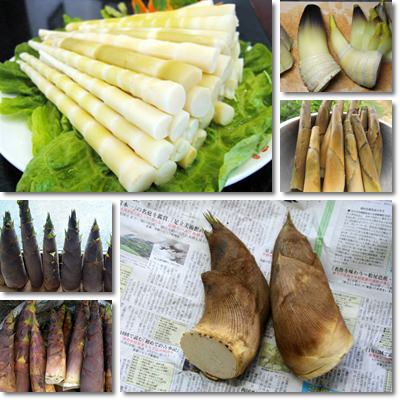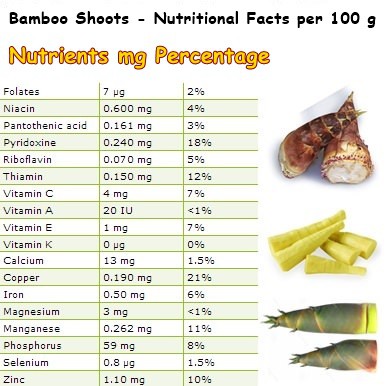Young, tender and fragrant bamboo shoots are an absolute culinary delicacy and a vegetable worth the attention of anyone looking to keep in good health. The shoots of this culinary vegetable are a common food in Asian cuisine, being particularly popular in China and Japan.
Although bamboo needs to be handled very carefully so as not to pose any health risks, consumption of properly cooked young shoots holds several impressive health benefits.
Bamboo shoots have a nutritional profile that promotes weight loss, encourages lower blood cholesterol levels, supports bowel function and digestion, reduces inflammation and maintains cell health. They contain generous amounts of vitamins B1 and B6, copper, manganese, phosphorus and zinc. Also, bamboo juice or poultices are said to calm pain and treat skin ulcerations.

What are bamboo shoots?
Culinary speaking, bamboo shoots are a vegetable. After a period of maybe 3-4 years, a new shoot, nurtured by the root of an already mature bamboo tree, will arise. This shoot or sprout can be collected and eaten like an ordinary vegetable, provided it comes from an edible bamboo species such as Bambusa vulgaris or Phyllostachys edulis.
What do bamboo shoots (sprouts) look like?
Bamboo shoots are either slim, stick-shaped or fairly bulky at the base with a thinner tip. In order to cook them, you first need to remove the outer layer to get to the edible flesh or core. Bamboo shoots are wrapped in a sort of green husk with purple, yellow or brown blotches. The core or flesh is creamy white and pleasantly flavored.
What do bamboo shoots taste like?
Bamboo shoots are full of flavor and have a somewhat chewy texture. If harvested early, they are very tender. However, there are some varieties that have a naturally hard texture and you will probably want to cook them well before starting to chew on them.
Fresh bamboo sprouts need to be consumed within 1-2 days after having been harvested or else they can turn bitter. Keeping them in a cool, dry place (preferably refrigerated), away from sunlight can help preserve the shoots for up to 10 days. Overall, bamboo sprouts make a delightful, savory vegetable, as long as you pick the right varieties.

Is all bamboo edible?
Except for a few varieties, many wild bamboo species are not edible. Even more, all bamboo plants contain various amounts of cyanogenic glycosides, toxic compounds also found in some wild almond varieties that are unsafe for consumption. For this reason it is crucial that you be extremely careful when choosing bamboo shoots.
Also, remember to always boil or soak fresh bamboo shoots in water overnight in order to get rid of possible toxins and bitterness. As long as the shoots come from an edible variety, eating them fresh will not harm you in any way. Shoots that are left to mature for too long tend to get hard, woody and rather bitter.
What are the health benefits of Bamboo Shoots?
With only 27 kcal/100 g of sprouts, you can ask for a second serving of bamboo shoots without having to worry about your weight. Even more, including them in your diet can help you lose weight without even trying. It’s a good idea to substitute more fattening foods in your diet with low calorie options like bamboo shoots for effortless weight loss.
Bamboo shoots contain around 2.2 g of fiber/100 g which not only helps relieve constipation naturally and maintains colon health, but also contributes to weight loss indirectly by limiting the absorption of dietary fat at the level of the intestinal tract.
The idea is that a good dietary supply of fiber adds bulk to stools which stimulates intestinal motility and encourages more frequent and regular bowel movements.
At the same time, our colon is less exposed to waste material from stools, which is said to lower disease risks. And fiber that is fermented by gut bacteria further contributes to the health of the gut lining as well as produces secondary metabolites that maintain a gut environment that prevents the growth of pathogenic bacteria. Research suggests that a fiber-rich diet may reduce colon cancer risks.
Bamboo shoots are a good source of thiamine (B1) and pyridoxine (B6) as well. These two B vitamins support carbohydrate synthesis, a process which produces energy for the body to use. Thiamine, in particular, is essential for healthy nerve cells and support brain function. In addition to this, bamboo shoots contain good amounts of copper, manganese, phosphorus and zinc. Copper is known for delaying hair graying and protecting cells against oxidative stress.

Phosphorus contributes to healthy bones and teeth and helps prevent osteoporosis and extrasystoles, while zinc strengthens the immune system. With 533 mg of potassium per 100 g, bamboo further provides cardiovascular benefits and is especially good for high blood pressure and benign arrhythmia such as extrasystoles. See what are extrasystoles and how to deal with them in extrasystoles and the heart.
Manganese is a powerful antioxidant which protects our cells from free radicals, reactive oxygen molecules which damage cells, causing them to mutate. When damage accumulates, cancerous formations may appear, but can be prevented by a generous intake of antioxidant-rich foods. In addition to the antioxidant mineral manganese, bamboo shoots are said to contain flavones, naturally occurring compounds with a similarly potent antioxidant action.
According to research, bamboo boasts anti-inflammatory properties. Poultices from crushed bamboo shoots can be applied externally to ulcerations, even small open wounds to promote faster healing and reduce pain. Bamboo sprout juice is said to be a good tonic with mild analgesic properties.
Bamboo shoots have a low sugar content (3 g of sugar/100 g), making them ideal if you are suffering from high blood sugar levels (hyperglycemia). Also low in fat (0.30 g of fat/ 100 g), they are great if you are struggling to keep cholesterol levels low and weight healthy.
Although the vegetable isn’t a source of complete protein with all essential amino acids (like meat, fish or dairy), 100 g of bamboo shoots has 2.6 g of protein, quite a generous amount, and supplies us with several essential and non-essential amino acids required to keep in good health. Amino acids in protein build muscle as well as repair damaged muscle tissue and contribute to good brain function.
Pickled bamboo shoots make an excellent probiotic food for gut health. Although they’re best eaten in moderation and infrequently, as part of a balanced and varied diet. However, if you have gastritis, an ulcer or acid reflux disease, it’s best to avoid pickles or, at least, avoid eating too much too often. See more foods to eat for healthy gut bacteria.
Conclusion
Overall, bamboo shoots make a savory, nutritious vegetable dish. You can stir-fry them, turn them into a creamy soup (although they tend to lose most of their flavor) or add them to stews alongside carrots and potatoes. Popular bamboo sprout recipes recommend combining them with pork, duck, rice or black or red beans. Pickled bamboo shoots are a favorite Asian side dish. When fresh shoots are not available, you can always opt for canned bamboo. Just remember it’s one of those foods that is made safe for eating by cooking it.
